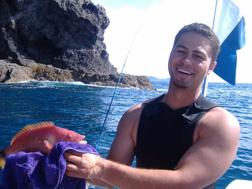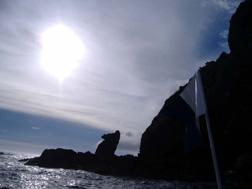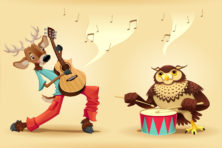The Life of a New Zealand Nanny
- Share
- Tweet
- Pin
- Share
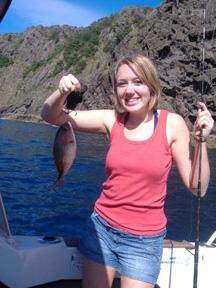
Waking in my gray tent, staked outside the Jones’ camper, or “caravan” as they would call it in New Zealand, I rub the tip of my finger against my numb, oversized lower lip and grope for a compact mirror on the sandy bottom of my tent. Dozens of new freckles reflect in the heart-shaped mirror, then the offending lip – a bit plumper and paler than usual but a change of feature only a friend might notice. I lather on ChapStick and inhale, at once aware of the taste that has been on the edge of my tongue since I arrived in Mangawhai, the reason my lip feels as swollen as my fingers after Easter ham – salt.
Hours after landing at the Auckland International Airport, where I was met with a warm hug from Yvonne, the mother of the family, a curious smile from nine-month-old Thomas, and a cold ginger beer (similar to root beer), I am participating in the average kiwi-holiday – camping, along with my new employers/caretakers/friends on the coast of the Pacific Ocean, overwhelmingly blue and still, though only feet away. A seeming myth to this Midwestern girl, I can only furrow my brows and try to comprehend the casualness with which the Jones’ and their local friends trade stories about catching fish as long as I am tall, stingrays rising from the sand as they plunge through the surface, and Great White sharks passing overhead as they dive for oversized crayfish.
“Great Whites,” I interrupt Colin, the father of the family, “like, Great Whites?”
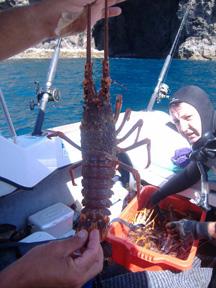
A crayfish with Colin in the background.
He smiles and nods his head, “I don’t look for them; I just know they are bound to be there.”
Six o’clock one morning, a slight poke and Colin’s kiwi-accent from outside the tent wakes me, “Sally, you want to go for a fish?”
While we drive through the small, sleepy town to the boat landing, visiting the local bakery as it opens for bacon and egg sandwiches along the way, he tells me about barracudas and sharks stealing hooked fish as he attempts to reel them in his white and green boat. And he talks of crayfish so sharp and fast his “lifetime guaranteed” crayfish gloves have lasted a mere nine months.
He cuts the boat through the waves, my body jolting, jaw rattling, as I brace myself with a silver bar while chatting with the local police officer, Simon, who literally stands center of the thundering, rocking, bouncing, crashing boat, one especially tan hand over the windshield as he asks me about my experience with water, with fishing – “Well, I grew up in Northern Minnesota,” I shout, “so we went out to the lakes a lot. We fished for walleye.” I am hoping this impresses him: “and I lived near the Great Lakes this past summer in Wisconsin.”
“How do you say it?” He laughs, red rugby shirt waving in the wind – and we’re not talking about water anymore.
“Wis-con-sin.” I repeat, “I have a bit of an accent – Wis-CON-sin.”
Simon and Colin dive near an inactive volcano miles from the shore, overgrown with green trees and riddled with underwater caves and caverns – crayfishes’ favorite hiding places. Bobbing in the boat, watching the blue water spread and move like a hand is slowly groping beneath the surface, I enjoy the sunshine’s heat, like a thick heavy blanket that diminishes with random spouts of cloud cover. Bubbles float and pop to the surface, neon shapes glide beneath the boat and finally, peace erupts into a scene of, what Colin has named, “carnage.”
“She’s petrified,” Simon laughs while I perch myself atop the passenger seat, holding my legs tight to my chest while six or seven large, red, wet crayfish crash from nets to the floor of the boat – some missing legs or antennas – swishing their tail ends with a crackle as Colin measures their width and Simon crawls about the boat retrieving the runaways.
Participation, on my part, comes in the form of simple rod fishing. Simon hooks chopped bait to our lines while Colin plunges to search for more crayfish. A tug of the line and I reel in a coral fish – red, bright, and exotic-looking. I sware I have fascinated over the same fish at an aquarium, somewhere.
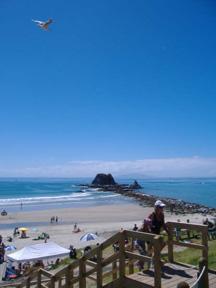
The Mangawhai surf beach, off the East Coast of New Zealand’s North Island.
The same surreal feeling passes when I am lathering SPF 45 over Thomas’s white cheeks at the crowded surf beach and a microphone squeaks to life, directing everyone’s attention to the five or six dolphins arching over the water alongside a passing boat.
Maddy, a dark-haired ten-year-old who loves Hannah Montana and High School Musical, asks me about the snow in the Midwest as we alternate talking and diving into the white-capped waves of the surf beach while Yvonne and Adrian, Maddy’s mother, help their toddler boys ride boogie boards closer to the shore.
Her body moves naturally in the water, her mouth still as I dive awkwardly, spitting and coughing the salt water every time I emerge, worried my lip grows larger each passing minute. She clarifies certain kiwi-words for me: togs = swimsuit, iceblock = popsicles, and chilly bin = freezer, while showing me gymnastic moves. After we ride the waves back to shore, she suggests I take a picture of the sun, for all my friends who are still enduring a harsh winter and the snow I told her about.
That night, after some pork kabobs, pronounced kebabs in New Zealand, and Cadbury chocolate, I brush my teeth under a bright, Big-Dipper-less, sky; my lip still feeling a tad unnatural. Sucking back some water and applying more ChapStick, I consider Maddy’s idea for a simple photo of the sun – perfect, that might be just what they need.
Sally Slattery was the Pulse’s Arts & Literature Intern during the summer and fall of 2008, and while she has travelled far from the shoreline of Door County to the islands of New Zealand since then, she continues to have a bit of insight on how to cope with a Midwestern winter.

